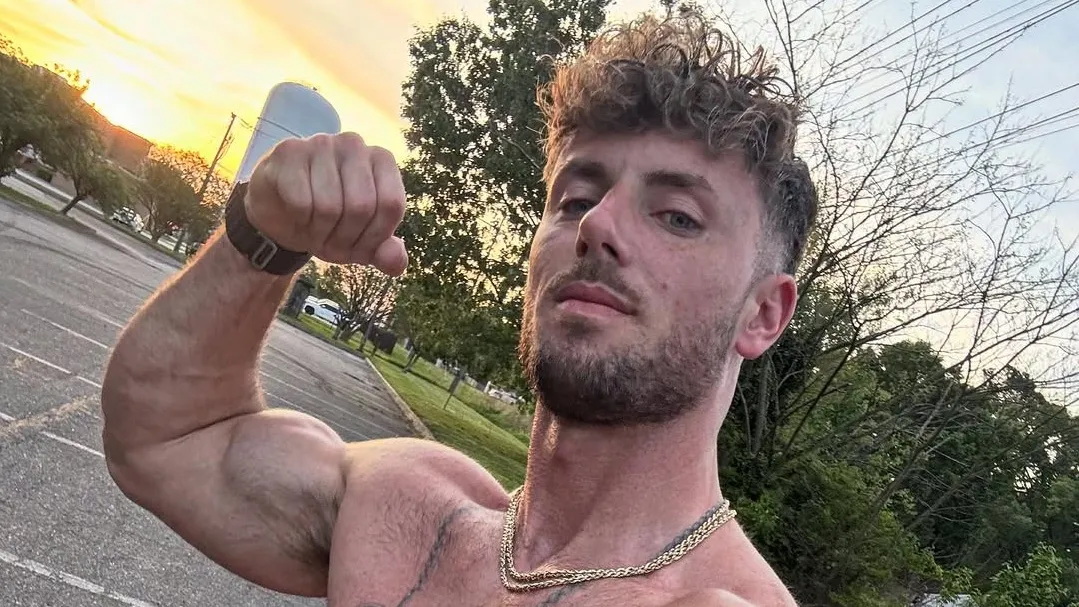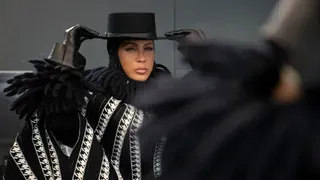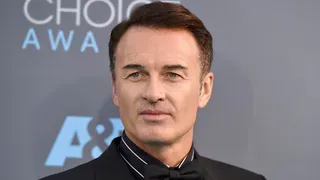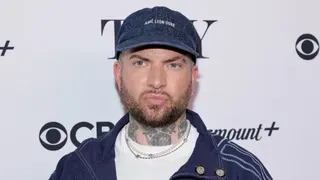April 26, 2005
Writing the Great American Gay Novel: An Interview with William Mann
Kilian Melloy READ TIME: 12 MIN.
As gay literature matures, the works of William J. Mann are right at the leading edge, as much in terms of literary quality and inventiveness as because of the genders, and the sexual identities, of their characters. Mann's first two novels, "The Men from the Boys" and its sequel, "Where the Boys Are" have both enjoyed phenomenal success, breaking out of the niche market and appealing to a wider readership; at the same time, Mann has delved into the eye of America's cultural and political struggles with his books and biographies about Hollywood and its gay and lesbian historic figures.
Each of Mann's so-called "Boys" books -- "The Men from the Boys," "Where the Boys Are," and his newly published novel, "All American Boy" -- is written with layers of metaphor and meaning, and is structured in quite complex, and strikingly different, ways. Two different story threads follow two different sequences of events in "The Men from the Boys," one in flashback and the other in the novel's present, until the two threads join up and tie together in the most lovely manner; in the sequel, "Where the Boys Are," multiple narrators tell the tale, with a perfectly straightforward recognition that they are addressing a reader in the context of a book; their first-person narrations don't shy away from catty, playful jibes about what the other narrators are probably saying and, more to the point, leaving out. In "All American Boy," Mann weaves together the surreal mishmash of memories of a senile woman and the seething, resentful reflections of her adult son, creating his most vivid and engaging novel yet. Each book places a premium of story and character, while still examining the political and social climate in which gays and lesbians seek to prosper. There's plenty out there that serves Mann's dramatic material: the AIDS epidemic, the need for stable family relationships in a culture that continually seeks to deprive gays of family, the rewriting of sexual codes of conduct -- or at least the stripping away of widely accepted pretense and pretext for sexual relations, and an examination of what replaces them.
William J. Mann chatted with EDGEBoston recently about writing the great American (gay) novel.
EDGEBoston: I notice there's a theme that runs through all of your novels, including the new one, "All American Boy," which is that the characters in your "Boys" novels -- and maybe also in "The Biograph Girl" -- have reached a crisis point in their lives, and it often has to do with age, and the need that comes along with that to re-establish themselves in a new context.
William J. Mann: Interesting observation? One of the things that fascinates me about human relationships is how they change. That is something that has always been an interest of mine -- the idea that people who are family to you, at one point in your life, move on to become something else; I'm always interested in that kind of transition that we have in our relationships.
EDGE: Including our relationship to ourselves.
WJM: Yeah, ultimately that's always the most interesting of them all.
EDGE: Looking through your books, there is another theme, at least in your "Boys" books. Each of those books takes on subjects that are of interest to the gay community. In earlier books you've talked about gay bashers, the question of how gay men hit the age of thirty and become invisible and how they deal with that -- but now, you take on the question of an adult man and a teenage boy having a sexual relationship, which seems pretty brave and provocative -- especially in the wake of Church scandals and so forth.
WJM: I'm not sure I was trying to be brave or provocative. It was a story that has fascinated me for along time. One of the things that I often wonder about, especially in the wake of these cases of adult men and teenaged boys being involved, is, Where is the line? What is appropriate? What isn't appropriate? Can there be love, can there be a positive, beneficial outcome to some relationships that society would say should never have occurred? Certainly, a [sexual] relationship between a grown man and five year old boy, we can clearly say that that is inappropriate, we can understand that, that makes a lot of sense. Once you get up a little [older], the "age of consent" idea becomes a little more permeable -- it becomes less definite. What is the line to be drawn? Is it okay for a nineteen-year-old boy and a sixteen-year-old boy to get together? The law would actually say no in some places. In fact, there's a nineteen-year-old or twenty-year-old sitting in jail in one of the Southern states because he'd had sex with a fifteen-year-old or sixteen-year-old boy. It becomes much more questionable, especially for somebody like Wally [in "All American Boy"], who comes from a place of being unloved and unhappy and never having known that kind of experience -- that affirmation of himself -- from either of his parents, and now suddenly there's this man giving it to him, and there are some people who would say that it was wrong, it was bad. I tried to stay away from making that decision myself -- I've had a couple of people say, "What do you feel?" I'm putting it out there for the reader to decide. I think Wally has come to the conclusion that it was beneficial to his life -- though he didn't think so at first, eventually I think he realizes that he got a lot out of that relationship, more than he was in any way damaged by it.
EDGE: How gays interact, not just with each other in gay society, or with society at large, but with their own families, is a fascinating part of your books. Especially in terms of the recurring parental motifs -- the mother whose maternal love falters, and the father whose traditional, paternal distance increases once they find out they have a gay child.
WJM: Right, well actually, in "Where the Boys Are," Jeff's father kind of comes around -- he's actually a little warmer, a little more open to change than the mother was. And in ["All American Boy"] it's the reverse -- the mother's the one who, after some struggle, can maybe -- maybe, possibly -- come around a little bit. But it is about trying to reach parents who don't get it, and in Wally's case it's the most dramatic situation of all. Obviously, the parent / child relationship is one that fascinates me, because I keep writing about it, don't I?
EDGE: Do you mind if I ask how your own family dynamics have affected your writing?
WJM: People always assume that I'm Jeff, from the other books ["The Men from the Boys" and "Where the Boys Are"], and one of the things that I always point out to show that I'm not is that I have a wonderful relationship with my parents. It wasn't always that way, but it was never as extreme as Jeff's situation was, and certainly not as extreme as Wally's was. My parents are working class, which is also a theme in the books, and it took them a while to move with me. I kind of dragged them kicking and screaming, in some ways, but they came. They were here when my partner and I got married last summer, legally, here in Massachusetts.
EDGE: Congratulations!
WJM: Thank you. They were here, thrilled and happy, beaming, and I would never expect it of 80 year olds who grew up in the world that they did. I'm much more fortunate than my characters. I don't know why I write about characters who have more struggle with their parents than I did.
EDGE: There's another thing that fascinates me, in terms of your contributions to horror anthologies and your editing of horror anthologies. There are inklings of the strange and mysterious that come into your books, and especially in "All American Boy" -- there's something of a ghost story in there and, at one point, there's even an intimation of a vampire being present. I'm interested in how you brought that into a book that is so realistic in so many ways -- and yet is also a surreal book at the same time.
WJM: I should give you a little history on "All American Boy," because the way it came about was a little different than my other novels. I had been writing short stories since I was in college. At one point, my editor at Kensington [said], "We want another book from you -- we want, actually, to do a two book contract with you," and I said, "I don?t really know what my next novel would be." I said, "How about a collection of short stories?" And I pulled out all my old short stories, and I realized that they were all from the perspective of a young gay man, or from an older straight woman. I realized that even though they were all different characters, they were in fact the same in many ways, and by just changing their names and their [settings], this series of stories suddenly became a complete novel. Almost every chapter in "All American Boy," with a couple of exceptions, started out as a short story that was either publisher somewhere else, or sat in my drawer for fifteen years. And some of them actually had a certain horror feel to them. When I first conceived the idea, I wanted to do it as kind of a magical realism book, and there is still some of that there -- there's obviously the scene with Zandy at the end, and there's also the scene when Regina meets the woman waiting for the bus, and you're not quite sure if the woman was ever really there, or if this is somehow some kind of mystical encounter. I left those [scenes] there, even though I knew they might feel a little jarring to some people, because the book is pretty realistic otherwise. I thought, "You know, this is a book about memories, this is a book about dreams, this is a book about chances and choices that we take." And I thought, "I think it works, I think I'll leave it there with that bit of mystery, that little bit of otherwordliness."
EDGE: Nothing wrong with that, especially since being gay in our society makes you feel otherworldy all of the time anyway.
WJM: Good point. Sure, absolutely.
EDGE: Aside from your novels, you've written quite a lot about Hollywood -- biographies of actors, a book about gay men and women in Hollywood, and you're working on a book about Kathryn Hepburn. I think it's interesting that Hollywood has such a gay imprint -- I love the part in "All American Boy" where the characters discuss the "gay code" in "Saturday Night Fever" -- and I wonder if this is partly why so many conservatives have it in for Hollywood.
WJM: Sure, I think the right wing does see Hollywood as the center of the moral failings of society, and there's the idea that they promote homosexuality, they promote extra-marital sex, they promote all sorts of things. I don't know if gayness would be the only they would charge Hollywood with, but that would certainly be high on the list as one of the evils that Hollywood promotes. I think it's interesting, because twenty years ago, maybe even ten years ago, Hollywood was still wrapped up in its own homophobia. There were all sorts of movies where homophobic jokes, anti-gay situations, and flaming stereotypical characters were common. I think in large part because so many gay writers and actors and producers have gotten involved, or at least come out of he closet and are working as openly gay people, we've seen that [homophobic attitude] drop off dramatically. I do think that television and movies today are in the cultural vanguard of the gay movement. It's one of the few bright spots I see on the horizon. But of course, the right wing is doing everything it can to change that, and I think Hollywood is feeling the pressure.
EDGE: Both from a professional point of view -- because you write about these matters -- and from a personal viewpoint, because you live in this culture, where do you fall in that spectrum of gay culture between the extreme that wants to assimilate and blend in with mainstream straight culture, and the opposite pole that celebrates being radically different in some ways and revels in being the "gay tribe" you mention in your books?
WJM: First of all, I think that the reason Tim and I got married wasn't so much that we wanted straight culture to think of us as one of them, but rather it was personally the right thing to do. It allowed us to be able to have a ritual that we could stand up with each other and bring the various parts of our lives together. And it was a ritual that was recognizable to the [people in] our lives in a way that a civil union might not have been. My parents could come, and they understood, and my siblings could come -- it was something, to stand up and hear the words, "By the authority invested in me by the State of Massachusetts?" It was empowering. It was a way to say to out families and to our friends, "This is who we are, and we invite you all now to celebrate this." It wasn't so much that we were hoping for some kind of a sanction from society, it was more of a personal affirmation.
But I do think that I was once of the persuasion that going after marriage was not my first personal choice of activism -- it wasn't that I thought our energy should be expended by trying to -- what's the phrase? "Be integrated into a burning house," you know, the James Baldwin allusion that straight society is crumbling. Why would we want to go into an institution, like marriage, which has failed heterosexuals? But at the same time I realized, when marriage became a hot-button issue, that there's really very little that we were doing that was actually more radical than this. The reaction against [gay marriage] shows the hypocrisy of the right, because they've always said that gay people are promiscuous, they can't form relationships that last, they're not interested in family, they're just interested in fucking? We're saying that we do want to get married, and it's not to show that, yes, we are just like you -- though that is one lesson that could be taken from this, because of course, on many levels, we are -- but it's also about changing the very notion of what marriage is, because marriage is not about procreation as the Christian right would want us to believe. That is a Christian concept. It's not a concept in other cultures. What we're doing is taking is taking this secular marriage idea and saying, "No, this is about love. This is about commitment between two people." That's what's making them nervous, because we're actually pulling their own definitions out from under their feet. That, to me, is a very exciting thing to be able to do.
I've never been an assimilationist, I've never wanted to fit into straight culture, and always lived in gay ghettos. When I lived in Boston, I lived in the South End. When I lived in D.C., I lived in Dupont Circle. When I loved in Los Angeles, I lived in West Hollywood. I've always lived among my open people, so to speak. But at the same time, I recognize that my world is not the world of most gay people -- the people who live in a much more mainstream world. And there are important benefits to convincing the populations that our similarities are much greater than our differences. I do believe that. As I get older, that becomes much more obvious to me. As wonderful as gay culture is, as much as I celebrate it -- I do, I love gay culture -- I also realize that the time is now for a broader understanding of our humanity. One of the greatest things for me is when I get an email from a straight reader that says that the story [in "The Men from the Boys" and "Where the Boys Are"] of Jeff and Lloyd touched her -- normally it's straight women, but a few straight men too -- and I think, "Gosh, they do recognize the universality of our struggle."
EDGE: So, looking ahead to your next novel, can we expect to see the word "Boy" will be in the title?
WJM: I realized that with "All American Boy," people were going to assume that it's a sequel of sorts to the other two "Boy" books, but it's not. And of course, the name of my other novel [includes] the word "Girl," so it would be nice if my next novel has neither one of those words in the title, but we'll see. If I were to do another sequel, it would have to be very different from either one of the first two books, just to structurally differentiate it from "The Men from the Boys." I would have to find another way of doing it so that each of the books stands on its own in a very distinct way.
I'm actually toying with some other ideas -- there's a story I have wanted to tell for a while about a boy and his grandmother, which is rather autobiographical for me. I'm not really sure where I'm going fiction-wise, and with the Hepburn book, which is taking up most of my time these days, it'll probably be awhile before I return to fiction anyway.
Kilian Melloy serves as EDGE Media Network's Associate Arts Editor and Staff Contributor. His professional memberships include the National Lesbian & Gay Journalists Association, the Boston Online Film Critics Association, The Gay and Lesbian Entertainment Critics Association, and the Boston Theater Critics Association's Elliot Norton Awards Committee.







